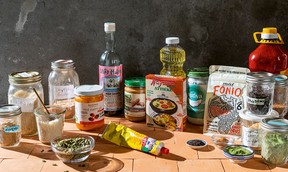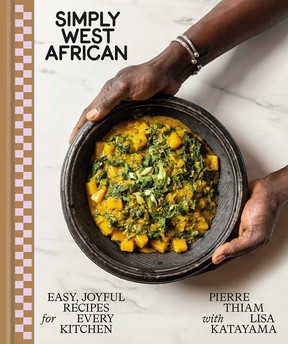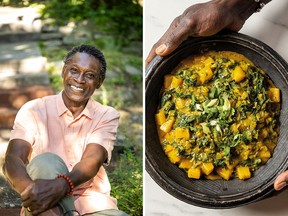Simply West African: Cuisine that transcends borders
‘This is a kind of cuisine that transcends borders, that’s very versatile. It gives its essence, its origin, but it’s also easy to adapt’
Reviews and recommendations are unbiased and products are independently selected. Postmedia may earn an affiliate commission from purchases made through links on this page.
Article content
Our cookbook of the week is Simply West African by Pierre Thiam with Lisa Katayama. To try a recipe from the book, check out: ginger chicken kedjenou, steamed cod liboke and coconut collard greens with butternut squash.
Pierre Thiam sees his fourth cookbook, Simply West African, as a continuation of his mission. The chef, entrepreneur and activist grew up in Senegal, on the coast of West Africa. Since he moved to New York City in the early 1990s, he has centred his work around West African food, and his message is as pressing as ever.
Advertisement 2
Article content
Article content
“It’s urgent work to me. I feel like there’s still lots to be done. It’s great to see that it’s catching up. And it’s great to see that there are other chefs who are also interested in talking about it and bringing it up. It’s still an uphill battle. There’s still so much ignorance about African food. And also, the fact that this food brings solutions to challenges that we are all facing on this planet.”
Climate-resilient crops such as fonio, millet and sorghum are underutilized, writes Thiam. The more the rest of the world embraces West African ingredients, the better for everyone — including the region’s smallholder farmers.
“By promoting it, by getting it more known, by having people be more interested in cooking it, in eating it, that addresses (food security) challenges. That not only makes our table more delicious, but it also allows us to consider that maybe there’s hope for the planet because of saving biodiversity. Maybe we are also bringing crops that are good for the planet — that are drought-resistant, climate-friendly.”
Through his company Yolélé, which he co-founded in 2017, Thiam partners with farmers’ collectives in West Africa, connecting them with local and global markets. Fonio (in whole-grain, pilaf and chip form) is their signature product.
Advertisement 3
Article content

Access to West African ingredients in North America is improving. Cambridge, Ont.-based Mychopchop, for example, ships African groceries across Canada and the United States. Thiam predicts that foods such as fonio will only become more accessible.
“From the moment I thought about making (West African food) a mission, I always knew it was just a matter of time. Because it’s a cuisine that (ticks so many boxes). It’s delicious, first of all. And it allows a growing number of people who are foodies, who are conscious consumers, to really explore — and explore in a way that’s positive because it helps to diversify the diet.”
Now based in Northern California, Thiam has lived in the United States for more than half his life. When he arrived in New York City, he had his sights set on a university in the Midwest. But after his life’s savings were stolen out of his suitcase at the boarding house he was staying in, what he thought would be a temporary stop became more lasting.
Thiam got a job as a busboy in hopes of getting back on his feet. Working his way up from dishwasher to chef in some excellent kitchens “in the food capital of the world,” his university plans gave way to a career in restaurants.
Advertisement 4
Article content
As much as Thiam loved the food scene in New York, he was frustrated. “I realized that my food was absent. And to me, that frustration turned into seeing it as an opportunity. It’s really how I started to make it more intentional — to find all my inspiration from that cuisine. I started with a catering business that turned into my very first restaurant in the early 2000s, and eventually, that continued to grow into writing cookbooks.”
In his first book, Yolele! Recipes from the Heart of Senegal (2008), Thiam drew from his origins. For the second, Senegal: Modern Senegalese Recipes from the Source to the Bowl (2015), he took readers to the roots of his native cuisine, sharing the stories of farmers, fishers and producers, and delving into the ingredients. His third, The Fonio Cookbook: An Ancient Grain Rediscovered (2019), focused on the quick-growing, drought-resistant grass species native to West Africa, which scientists have highlighted as being a “future food” that could loom large in global diets by 2050.

Thiam’s goal with Simply West African was to illustrate how to incorporate the flavours of his home region any night of the week. He goes over pantry staples such as fonio, sustainably sourced red palm oil, peanut butter, fish sauce and nokos (a green seasoning). Recipes range from sauces and snacks to meat, seafood, vegetables, grains and beans.
Advertisement 5
Article content
The book’s subtitle — “easy, joyful recipes for every kitchen” — is heartfelt. Thiam wrote it with accessibility in mind. “It doesn’t have to be something that you plan ahead of time, but you can have it on a Tuesday night or Monday night after work. It’s not only fun, great, exciting flavours, but it can be done every day. And it’s good for you to consume — a very balanced, healthy cuisine, as well.”
Working on the book with his wife, writer Lisa Katayama, added another layer of motivation, says Thiam. Simply West African is centred around home cooking, and the recipes reflect what he and Katayama cook for their family.
Katayama grew up in Japan and Thiam draws inspiration from both their backgrounds, using Japanese short-grain rice in his pumpkin-peanut rice balls, for instance, adding kankankan (a spice blend from the Hausa tribe in northern Nigeria) to yakitori-style chicken, and using umeboshi to top a fonio porridge akin to okayu, flecked with smoked mackerel and fresh ginger.
“This is a kind of cuisine that transcends borders, that’s very versatile. It gives its essence, its origin, but it’s also easy to adapt. And that’s what this book allows you to do sometimes. So, the ingredients, when they’re not accessible, there are substitutes that are easy to make. And you keep true to the food and true to the experience that you have after cooking it with the substitutes that are accessible around the corner from your local market.”
Advertisement 6
Article content
Related Stories
-
![Clockwise from top left: ginger chicken kedjenou with eggplant and tomato, steamed cod liboke, coconut collard greens with butternut squash and West African pantry staples. PHOTOS BY EVAN SUNG]()
Cook This: Three recipes from Simply West African
-
![Experts have identified fonio, a grass species native to the savannas of West Africa, as holding great promise for the future.]()
This tiny grain has big potential as a food of the future
Thiam has travelled extensively in West Africa, where he identified a “cultural unity” in the food. Each area may have a particular way of presenting dishes, but he saw a connection. “If I had decided to limit myself to borders, it would have been a disservice to that cuisine. I really wanted to offer readers something that made sense. And it also makes sense because these borders are not real. These borders are inventions.”
Food is a powerful medium, adds Thiam — one that can connect all of us. Teranga is the name of his restaurant chain, with two locations in New York City, but it’s also a guiding philosophy. Roughly speaking, the word means “good hospitality” in Wolof, a national language of Senegal. But to Thiam, it’s so much more.
He learned about the importance of teranga from his mother, who always cooked extra food so she was prepared for unexpected guests. You never cook for yourself alone, says Thiam — you cook to share. And the cooking isn’t contained to the kitchen. It begins at the market, where you touch the ingredients, and ends when the bowl is empty and everyone is satisfied.
“Teranga is really the word that symbolizes the power of food. It’s a way to dismantle the borders and really create loving bonds and understanding, too. West Africa, (and) Africa itself is so misunderstood. There’s so much more to know. And through food, it allows people to be more open to see the beauty of a culture.”
Our website is the place for the latest breaking news, exclusive scoops, longreads and provocative commentary. Please bookmark nationalpost.com and sign up for our cookbook and recipe newsletter, Cook This, here.
Article content
‘This is a kind of cuisine that transcends borders, that’s very versatile. It gives its essence, its origin, but it’s also easy to adapt’

Reviews and recommendations are unbiased and products are independently selected. Postmedia may earn an affiliate commission from purchases made through links on this page.
Article content
Our cookbook of the week is Simply West African by Pierre Thiam with Lisa Katayama. To try a recipe from the book, check out: ginger chicken kedjenou, steamed cod liboke and coconut collard greens with butternut squash.
Pierre Thiam sees his fourth cookbook, Simply West African, as a continuation of his mission. The chef, entrepreneur and activist grew up in Senegal, on the coast of West Africa. Since he moved to New York City in the early 1990s, he has centred his work around West African food, and his message is as pressing as ever.
Advertisement 2
Article content
Article content
“It’s urgent work to me. I feel like there’s still lots to be done. It’s great to see that it’s catching up. And it’s great to see that there are other chefs who are also interested in talking about it and bringing it up. It’s still an uphill battle. There’s still so much ignorance about African food. And also, the fact that this food brings solutions to challenges that we are all facing on this planet.”
Climate-resilient crops such as fonio, millet and sorghum are underutilized, writes Thiam. The more the rest of the world embraces West African ingredients, the better for everyone — including the region’s smallholder farmers.
“By promoting it, by getting it more known, by having people be more interested in cooking it, in eating it, that addresses (food security) challenges. That not only makes our table more delicious, but it also allows us to consider that maybe there’s hope for the planet because of saving biodiversity. Maybe we are also bringing crops that are good for the planet — that are drought-resistant, climate-friendly.”
Through his company Yolélé, which he co-founded in 2017, Thiam partners with farmers’ collectives in West Africa, connecting them with local and global markets. Fonio (in whole-grain, pilaf and chip form) is their signature product.
Advertisement 3
Article content

Access to West African ingredients in North America is improving. Cambridge, Ont.-based Mychopchop, for example, ships African groceries across Canada and the United States. Thiam predicts that foods such as fonio will only become more accessible.
“From the moment I thought about making (West African food) a mission, I always knew it was just a matter of time. Because it’s a cuisine that (ticks so many boxes). It’s delicious, first of all. And it allows a growing number of people who are foodies, who are conscious consumers, to really explore — and explore in a way that’s positive because it helps to diversify the diet.”
Now based in Northern California, Thiam has lived in the United States for more than half his life. When he arrived in New York City, he had his sights set on a university in the Midwest. But after his life’s savings were stolen out of his suitcase at the boarding house he was staying in, what he thought would be a temporary stop became more lasting.
Thiam got a job as a busboy in hopes of getting back on his feet. Working his way up from dishwasher to chef in some excellent kitchens “in the food capital of the world,” his university plans gave way to a career in restaurants.
Advertisement 4
Article content
As much as Thiam loved the food scene in New York, he was frustrated. “I realized that my food was absent. And to me, that frustration turned into seeing it as an opportunity. It’s really how I started to make it more intentional — to find all my inspiration from that cuisine. I started with a catering business that turned into my very first restaurant in the early 2000s, and eventually, that continued to grow into writing cookbooks.”
In his first book, Yolele! Recipes from the Heart of Senegal (2008), Thiam drew from his origins. For the second, Senegal: Modern Senegalese Recipes from the Source to the Bowl (2015), he took readers to the roots of his native cuisine, sharing the stories of farmers, fishers and producers, and delving into the ingredients. His third, The Fonio Cookbook: An Ancient Grain Rediscovered (2019), focused on the quick-growing, drought-resistant grass species native to West Africa, which scientists have highlighted as being a “future food” that could loom large in global diets by 2050.

Thiam’s goal with Simply West African was to illustrate how to incorporate the flavours of his home region any night of the week. He goes over pantry staples such as fonio, sustainably sourced red palm oil, peanut butter, fish sauce and nokos (a green seasoning). Recipes range from sauces and snacks to meat, seafood, vegetables, grains and beans.
Advertisement 5
Article content
The book’s subtitle — “easy, joyful recipes for every kitchen” — is heartfelt. Thiam wrote it with accessibility in mind. “It doesn’t have to be something that you plan ahead of time, but you can have it on a Tuesday night or Monday night after work. It’s not only fun, great, exciting flavours, but it can be done every day. And it’s good for you to consume — a very balanced, healthy cuisine, as well.”
Working on the book with his wife, writer Lisa Katayama, added another layer of motivation, says Thiam. Simply West African is centred around home cooking, and the recipes reflect what he and Katayama cook for their family.
Katayama grew up in Japan and Thiam draws inspiration from both their backgrounds, using Japanese short-grain rice in his pumpkin-peanut rice balls, for instance, adding kankankan (a spice blend from the Hausa tribe in northern Nigeria) to yakitori-style chicken, and using umeboshi to top a fonio porridge akin to okayu, flecked with smoked mackerel and fresh ginger.
“This is a kind of cuisine that transcends borders, that’s very versatile. It gives its essence, its origin, but it’s also easy to adapt. And that’s what this book allows you to do sometimes. So, the ingredients, when they’re not accessible, there are substitutes that are easy to make. And you keep true to the food and true to the experience that you have after cooking it with the substitutes that are accessible around the corner from your local market.”
Advertisement 6
Article content
Related Stories
-
![Clockwise from top left: ginger chicken kedjenou with eggplant and tomato, steamed cod liboke, coconut collard greens with butternut squash and West African pantry staples. PHOTOS BY EVAN SUNG]()
Cook This: Three recipes from Simply West African
-
![Experts have identified fonio, a grass species native to the savannas of West Africa, as holding great promise for the future.]()
This tiny grain has big potential as a food of the future
Thiam has travelled extensively in West Africa, where he identified a “cultural unity” in the food. Each area may have a particular way of presenting dishes, but he saw a connection. “If I had decided to limit myself to borders, it would have been a disservice to that cuisine. I really wanted to offer readers something that made sense. And it also makes sense because these borders are not real. These borders are inventions.”
Food is a powerful medium, adds Thiam — one that can connect all of us. Teranga is the name of his restaurant chain, with two locations in New York City, but it’s also a guiding philosophy. Roughly speaking, the word means “good hospitality” in Wolof, a national language of Senegal. But to Thiam, it’s so much more.
He learned about the importance of teranga from his mother, who always cooked extra food so she was prepared for unexpected guests. You never cook for yourself alone, says Thiam — you cook to share. And the cooking isn’t contained to the kitchen. It begins at the market, where you touch the ingredients, and ends when the bowl is empty and everyone is satisfied.
“Teranga is really the word that symbolizes the power of food. It’s a way to dismantle the borders and really create loving bonds and understanding, too. West Africa, (and) Africa itself is so misunderstood. There’s so much more to know. And through food, it allows people to be more open to see the beauty of a culture.”
Our website is the place for the latest breaking news, exclusive scoops, longreads and provocative commentary. Please bookmark nationalpost.com and sign up for our cookbook and recipe newsletter, Cook This, here.
Article content



Comments
Postmedia is committed to maintaining a lively but civil forum for discussion and encourage all readers to share their views on our articles. Comments may take up to an hour for moderation before appearing on the site. We ask you to keep your comments relevant and respectful. We have enabled email notifications—you will now receive an email if you receive a reply to your comment, there is an update to a comment thread you follow or if a user you follow comments. Visit our Community Guidelines for more information and details on how to adjust your email settings.